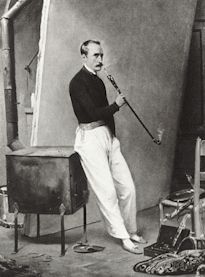 |


|
|
The Life Of Astolfe de Custine A Taste For Freedom: The Life Of Astolfe de Custine by Anka Muhlstein; Helen Marx Books; 391 pages; $16.95.
His most famous book, "Russia in 1839", did for Imperial Russia what "Democracy in America," by Custine's fellow aristocrat Alexis de Tocqueville, did for the United States. "Russia in 1839" did not endure the way "Democracy in America" has - Russia, after all, went through many changes since 1839, while the USA remains essentially the same. But Custine's scathing attack on Tsarist autocracy gave the book renewed popularity during the Cold War, when George Kennan called it "the best guide to Russia ever written." Astolphe de Custine was as notable for his open homosexuality as he was for his writings. We are told that "every mother wanted this elegant, intelligent, modest young man, whose conversation was delightfully brilliant and full of surprises [is that a give-away or what?] for her daughter." Though Custine was married for a few years, his marital status did not stop him from starting a lengthy and rather open relationship with the Englishman Edward Saint-Barbe. "For thirty years Custine and Saint-Barbe led a respectable conjugal life, marked, if not by complete faithfulness, at least by absolute loyalty." Even a sexual scandal in 1824 did little to ruin his reputation. Alas, Custine's death, like so many others since, left Saint-Barbe at the mercy of Custine's relatives, who unsuccessfully tried to take Custine's fortune away from his lover. A Taste for Freedom is a good introduction to the life and times of Astolphe de Custine. Unfortunately for Custine-philes, Anka Muhlstein's biography - the only one currently available in English - is too brief, and her style seems inadequate to the subject at hand (though here translator Teresa Waugh might be partly responsible). On the other hand, Muhlstein does justice to Custine's homosexuality, noting the link between Custine's open gayness (if we can use that term to describe an early 19th century personality) and his work: "this unyielding attachment to personal liberty is inseparable from Custine's literary success." After a century of obscurity, Astolphe de Custine is once again a subject of interest, and his books are back in print. A Taste for Freedom is a major part of this revival. Queer Corners by Donald Olson; BridgeCity Books; 327 pages; $14.95.
There are no working class queers in this microcosm, nor any PWAs (as of yet). We meet this motley group at the funeral of their mentor, Delmont Percy, the "father" of Queer Corners. Into this lesbian and gay Eden move two serpents: Ron Labonne of the American Christian Alliance and his televangelist wife, Cornette, who buy Delmont's home. As if having two taste-less heteros move into the neighborhood was not bad enough, Ron and Cornette add injury to insult when they introduce a statewide initiative that would void all existing gay rights laws in Oregon. Olson obviously based Labonne's American Christian Alliance on Lon Mabon's Citizens Alliance, which introduced an antigay initiative in Oregon in 1992. (Mabon's initiative was defeated by a margin of 57 to 43% of the vote.) It doesn't take a genius to tell the good guys and gals from the bad ones in Queer Corners. Ron and Cornette are so evil it's amazing they managed to amass the reputation and the following that they have. On the other hand, the gays and lesbians (except Terry) are good and wise and talented. They might have their petty differences, but they join forces in order to fight their common foe. The fate of Queers Corners is worth their effort. Kids of all ages who are just coming out will find Queer Corners an uplifting and enjoyable read. Those of us who expect more substance from our books will find it a disappointment. I made the mistake of reading Queer Corners after I finished a true classic of gay literature, Colm Toibin's Story of the Night. Comparing Toibin's great work with Queer Corners reminded me of what gay literature can accomplish, and what it often settles for. Donald Olson's book, alas, is all too typical of contemporary gay fiction. |
 © 1997-2000 BEI
© 1997-2000 BEI
 Astolfe de Custine, from the cover of A Taste for Freedom
Astolfe de Custine, from the cover of A Taste for Freedom